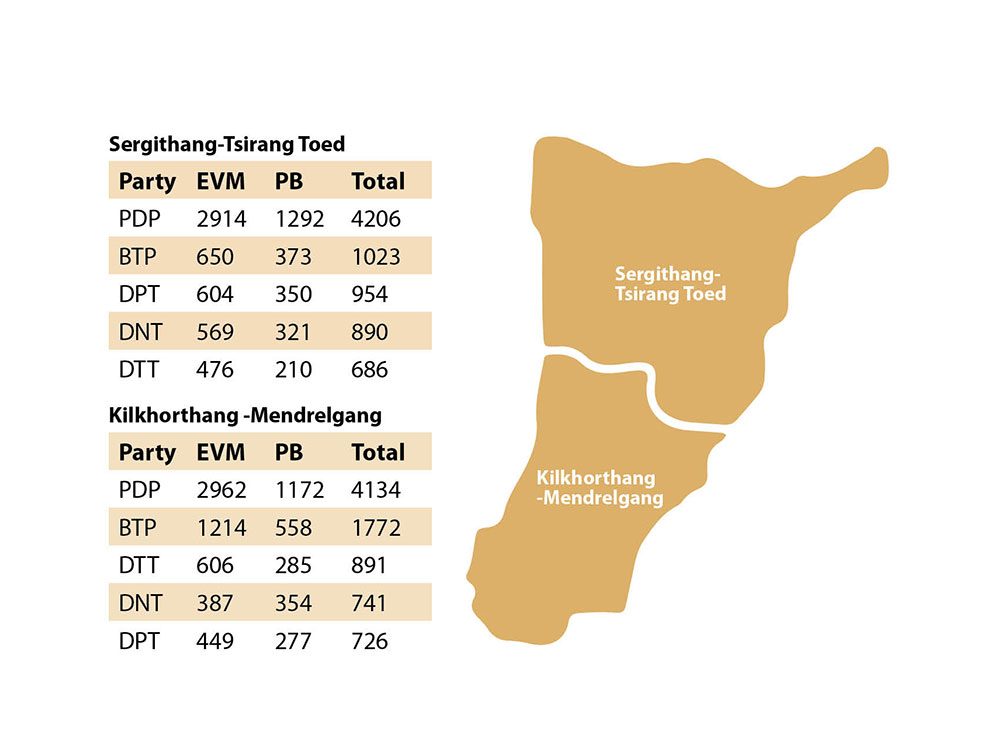Voters in the vegetable capital sent six MPs to the ruling party so far
Yangyel Lhaden
Tsirang has a history of consistently electing a member of parliament (MP) from the ruling party. This is evident from the election record books.
In the primary round of the 2023-24 Assembly election, their first two choices—People’s Democratic Party (PDP) and Bhutan Tendrel Party (BTP)—made it to the general election.
The PDP secured a landslide victory in the two constituencies – Sergithang-Tsirangtoe and Kilkhorthang-Mendrelgang, with over 4,000 votes in each constituency, surpassing BTP by more than fourfold.
In Sergithang-Tsirangtoe, PDP received 4,206 votes to BTP’s 1,023. In Kilkhorthang-Mendrelgang, PDP secured 4,134 votes, surpassing BTP’s 1,772 votes.
Tsirang had two Members of Parliament during the second government, PDP tenure – former MP Novin Darlami from Sergithang-Tsirangtoe and former MP Yogesh Tamang from Kilkhorthang-Mendrelgang.
The district is known for voting for change. Despite the dzongkhag voting for Druk Phuensum Tshogpa (DPT) during the first election, 2008, they chose to vote for PDP in the second election.
In the 2008 election, Sergithang-Tsirangtoe gave 66.4 percent of their votes to DPT, while Kilkhorthang-Mendrelgang gave 73 percent of their votes to DPT.
Tsirang voting for change became more evident when in the third election, both constituencies supported Druk Nyamrup Tshogpa (DNT) who eventually became the third government.
Even when DPT’s Kilkhorthang-Mendrelgang former MP Yangku Tshering Sherpa, whom they gave 73 percent of the total votes during first election, came to contest the third election against DNT’s former MP Bimal Tharpa, the people of Kilkhorthang-Mendrelgang supported DNT.
Former MP Bimal Tharpa beat Yangkhu Tshering Sherpa by a huge margin.
Tsirang for BTP?
This time, Tsirang went with BTP. However, as the two parties head to the general round, will they change to PDP who won the primary round with a massive difference?
Looking back at past elections, Tsirang could vote for a ruling government candidate.
In the 2013 elections, Sergithang-Tsirangtoe supported the PDP, while Kilkhorthang-Mendrelgang’s first choice was DPT during the primary round.
The tables turned when Kilkhorthang-Mendrelgang voted for PDP during the general round and managed to secure an MP from the ruling government when PDP won the 2013 election.
The dzongkhag has 27,037 egistered voters, which accounts for 5.4 percent of the total registered voters, 497,058, in the country. During the recent primary round, 16,023 voted, making five percent of the total voter turnout.
In the last decade, the number of registered voters in the dzongkhag has increased from 20,863 during the 2013 primary election to 27,037 in this year’s primary election. In 2013, a total of 10,716 votes were cast during the primary election.
Votes in the electronic voting machine ( EVM) have not changed much in a decade. In the 2013 primary election, 9,106 individuals voted through EVM. In the 2023 primary round, only closr to two thousand more voted through EVM, despite a voter turnout increase of more than 5,000 this year.
The noticeable increase in votes is observed in postal ballots. In the 2013 primary election, only 1,610 individuals voted through postal ballots, while 5,192 votes were cast through postal ballots in this year’s primary election.


